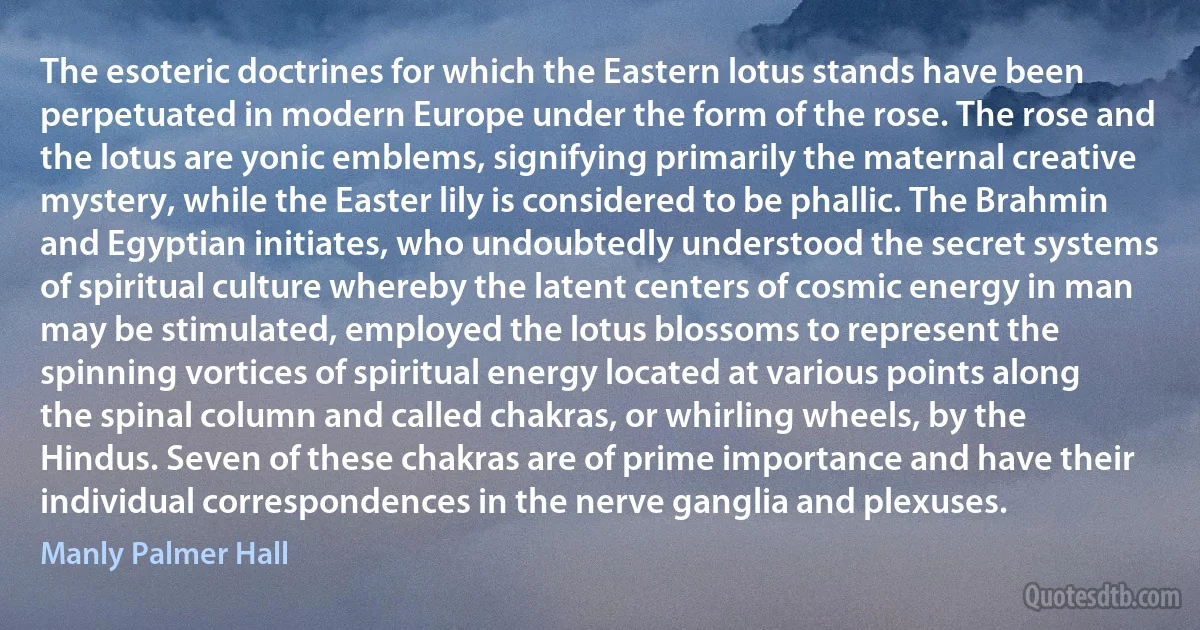
The esoteric doctrines for which the Eastern lotus stands have been perpetuated in modern Europe under the form of the rose. The rose and the lotus are yonic emblems, signifying primarily the maternal creative mystery, while the Easter lily is considered to be phallic. The Brahmin and Egyptian initiates, who undoubtedly understood the secret systems of spiritual culture whereby the latent centers of cosmic energy in man may be stimulated, employed the lotus blossoms to represent the spinning vortices of spiritual energy located at various points along the spinal column and called chakras, or whirling wheels, by the Hindus. Seven of these chakras are of prime importance and have their individual correspondences in the nerve ganglia and plexuses.
Manly Palmer HallRelated topics
brahmin creative easter egyptian esoteric form latent man maternal nerve rose secret seven signifying spinal under vortex while whirling points wheelsRelated quotes
I think we've been through a period where too many people have been given to understand that if they have a problem, it's the government's job to cope with it. 'I have a problem, I'll get a grant.' 'I'm homeless, the government must house me.' They're casting their problem on society. And, you know, there is no such thing as society. There are individual men and women, and there are families. And no government can do anything except through people, and people must look to themselves first. It's our duty to look after ourselves and then, also to look after our neighbour. People have got the entitlements too much in mind, without the obligations. There's no such thing as entitlement, unless someone has first met an obligation.

Margaret Thatcher
Justice is the end of government. It is the end of civil society. It ever has been, and ever will be, pursued, until it be obtained, or until liberty be lost in the pursuit. In a society, under the forms of which the stronger faction can readily unite and oppress the weaker, anarchy may as truly be said to reign, as in a state of nature where the weaker individual is not secured against the violence of the stronger: And as in the latter state even the stronger individuals are prompted by the uncertainty of their condition, to submit to a government which may protect the weak, as well as themselves: so in the former state, will the more powerful factions be gradually induced by a like motive, to wish for a government which will protect all parties, the weaker as well as the more powerful.

Alexander Hamilton
Let true Christians then, with becoming earnestness, strive in all things to recommend their profession, and to put to silence the vain scoffs of ignorant objectors. Let them boldly assert the cause of Christ in an age when so many, who bear the name of Christians, are ashamed of Him: and let them consider as devolved on Them the important duty of suspending for a while the fall of their country, and, perhaps, of performing a still more extensive service to society at large; not by busy interference in politics, in which it cannot but be confessed there is much uncertainty; but rather by that sure and radical benefit of restoring the influence of Religion, and of raising the standard of morality.

William Wilberforce
In cantoning the troops and drawing supplies for their subsistence, it may not be amiss to have an eye to the affair of next campaign. The expense and difficulty of transportation from the Western States, your Excellency is perfectly acquainted with. You are also sensible that the long tract of barren country, through which the supplies must come, will only admit of a certain quantity of transportation; therefore I conceive, that good policy points out the necessity of keeping as many stores in reserve in this State as possible. This is necessary, not only to be prepared for any emergency that may happen from the enemy's turning their force against the Eastern States, but to have a magazine in readiness for a secret purpose, which your Excellency hinted to me a few days since.

Nathanael Greene
A common monetary standard will be established, with the consent of the various governments, by which industrial transactions will be greatly facilitated. Three spheres made respectively of gold, silver, and platinum, and each weighing fifty grammes, would differ sufficiently in value for the purpose. The sphere should have a small flattened base, and on the great circle parallel to it the Positivist motto would be inscribed. At the pole would be the image of the immortal Charlemagne, the founder of the Western Republic, and round the image his name would be engraved, in its Latin form, Carolus; that name, respected as it is by all nations of Europe alike, would be the common appellation of the universal monetary standard.

Auguste Comte
